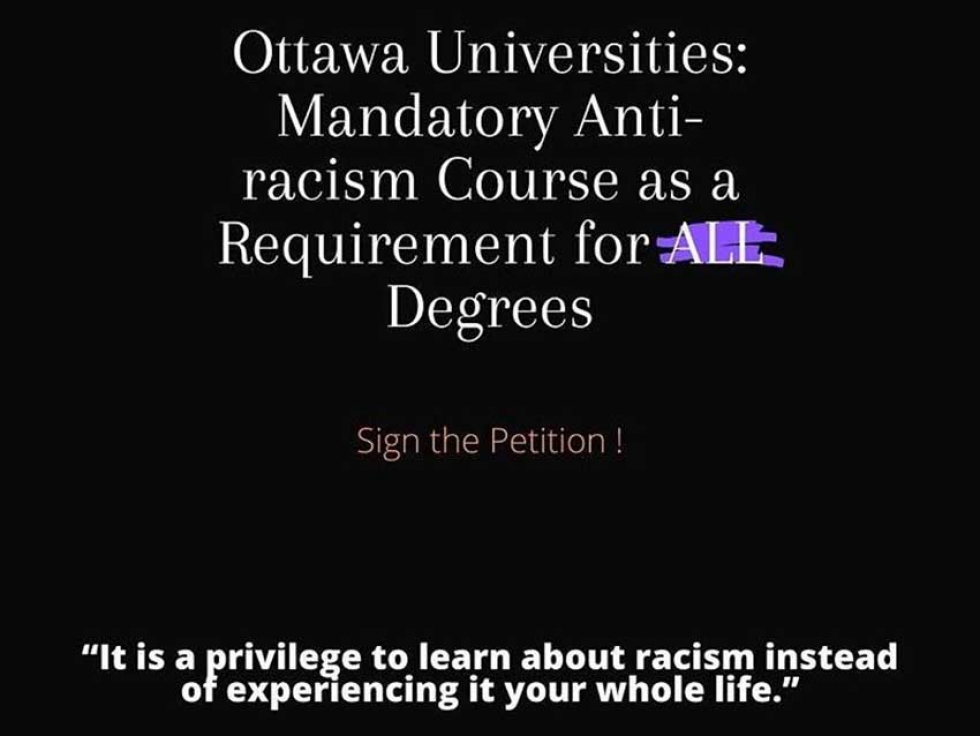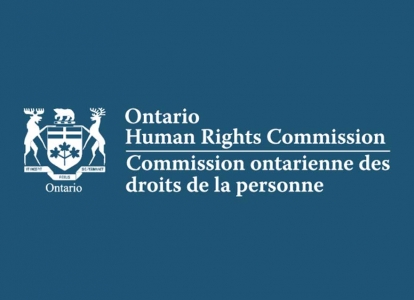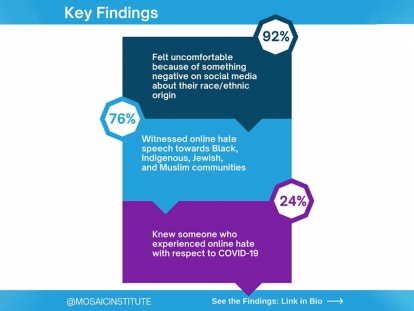
Jul
Carleton University Student's Petition Demanding a Mandatory Anti-Racism Course Requirement for All Ottawa University Graduates Gains Over 12,000 Signatures
Written by Chelby DaigleMoroccan Canadian Khadija El Hilali is currently working with a small team of fellow students to address racism on the campuses of two of Ottawa's largest universities.
She launched a petition on Change.org demanding that an anti-racism course be a degree requirement for all graduates of the two major universities in Ottawa, the University of Ottawa and Carleton University. At the time of writing this, the petition has gathered over 12,000 signatures.
Muslim Link interviewed Khadija about her initiative to address racism on Ottawa campuses.
Tell us about yourself
I am a 22-year-old Carleton University student, studying in Public Affairs.
I was born in Tangier, Morocco, and my family and I moved to Canada in 2006. Upon my arrival 14 years ago at the age of 8, my first challenge was learning the two official languages of Canada (English and French). My second challenge was facing racism and labeling it as bullying. I didn't know the language and so I didn't have a way to let anyone know what was going on. I shared many incidents with my mother, who is a single mother and didn't speak fluent English. As the years went on, I knew I wanted to go to school for something that will have an impact and make a difference for those around me. I believe it’s important that everyone knows the different ways that racism exists and what each of us can do to help remedy this issue.
Tell us about why you and your teammates came up with the idea of launching a petition to demand a mandatory Anti-Racism Course for students in all degrees at universities in Ottawa.
Our initiative started off as two separate projects:
1) Launching a petition demanding that an anti-racism course be a degree requirement: gaining petition signatures for a petition letter addressed to the Presidents of the two universities,
2) Compiling stories from university students: creating a document outlining racially motivated incidents on campus to bring to the President’s attention as a call to action to the University to take action against racism on campus.
The petition was initiated by myself and the document compiling student's stories was initiated by two of my friends who attend the University of Ottawa. We decided to combine our projects to complement each other’s initiatives and support each other. We believe that this will have a positive impact on students on campus and when they graduate. We also believe that this will have a ripple effect and encourage other universities to take similar action.
Carleton University and the University of Ottawa, based in the nation's capital, pride themselves on attracting many students from across Canada and around the world. The proximity to Canada's governmental buildings and the heart of politics encourages many students to pursue their post-secondary education in Ottawa. We believe that Carleton University and the University of Ottawa, through the implementation of this requirement, will play an influential role in dismantling systemic racism in Canada.
This is an opportunity for each of these universities to put their words into action that will have an impact on many. It is the responsibility of the universities to educate people on the reality of existing and working in a diverse population. Students attend University for many reasons, one of them is to prepare and equip us for our chosen careers, this includes teaching us about the existent racism in Canada’s system and equipping us with tools on how to undo systemic racism within each field. No matter what field an individual chooses, racism exists in one way or another. We witness racism in the healthcare system, in the legal justice system, in the policy and management field, we’ve seen environmental anti-indigenous discrimination, and the list goes on.
Are you proposing a course that will be aimed at educating people on how to become anti-racist? Would the course you are proposing take the approach of Ibram X. Kendi's "How to Be an Anti-Racist" where he explores his own journey as a Black man who needs to unlearn racism, and learn to be anti-racist. In the work, Kendi recognizes that just because he is a racialized person doesn't mean he does not believe in racist ideas about his own community and other racialized communities. Would the course you are proposing focus on ensuring that EVERYONE, no matter their racial background, better understand the work they need to do to become anti-racist?
The proposed mandatory anti-racism course would have two purposes:
(1) to help students understand and identify that racism and discrimination are entrenched in many established institutions (criminal justice, employment, housing, education, healthcare, political power, etc.) and
(2) to help build a set of beliefs, actions, movements, and tools that oppose this racism.
By making this course mandatory for all first-year students, that means that every student must learn and understand these two purposes regardless of their background. Also, we understand that many people face discrimination and oppression based on many different factors, including skin color, ability, gender, class, religion, ethnicity, sexual orientation, sexuality, etc., and therefore, this requirement will take an intersectional approach. With that being said, it will also be important to touch upon subjects like colourism, internalized racism and historical events that have been erased. Thus, this is why we decided to have a list of courses that can satisfy this requirement, rather than one course that everyone must take. This will allow students to choose a course that they are interested in and can engage with the content based on their personal experiences and/or interests.
You identify three racialized groups on campus "Black, Indigenous and People of Color (BIPOC)". In the Canadian context, these groups may all be impacted by racism, but there is evidence that the impact of racism for each of these communities can be quite different, for example, systemic racism within Canada's educational system has led to a serious lack of representation of Indigenous and Black students on university campuses in Ontario. Increasingly, Indigenous and Black communities are demanding more focus on their particular struggles with anti-Indigenous and anti-Black racism, would it not be ideal to require separate courses to educate students about these particular experiences given the disproportionate ways in which these communities are negatively impacted by systemic racism in Canada?
We recognize each racialized group experiences racism differently, and because of that, the impacts are different. We would do our mission a disservice if we tried to pack everything related to racism into one 'generic' course. Our suggestion to the universities is the following: to generate a list of anti-racism courses that cover different topics related to systemic racism in Canada. These courses already exist in Carleton University and the University of Ottawa, but they are optional and would need to be tweaked to highlight anti-racism. We also are asking that these courses touch on important topics such as Canada's racism in historical events and the continuing anti-BIPOC racism and the different ways that it exists today and educating students on how to actively be anti-racist on campus and when they graduate. Additionally, this will allow students to have options, based on their interests and field of study, to satisfy this requirement.
What are the desired outcomes you would hope that the mandatory course achieves both on campus and in the workplaces university graduates go on to work with?
Based on our research, we believe that this mandatory requirement will educate students about racism and recognize the different ways it exists. Additionally, this will equip university graduates with knowledge and tools on how to combat racism in their workplaces and chosen fields. Racism exists in various ways and usually the discussion only reaches the tip of the iceberg. We tend to divide people into two distinct positions: victim and perpetrator. This course will help equip students with the understanding that our racist actions and behaviors are always embedded in relations of power and to act from that recognition. Rather than defending individual action, students will have learned that taking accountability means addressing the impact of their behavior and its relation to broader systemic oppression. Briefly, we are hoping this course will help students understand that combating racism lies in the everyday work of addressing and transforming systemic manifestations of oppression and power.
You are also currently collecting the personal experiences of students on campus. How are you making sure that "Black, Indigenous and People of Color (BIPOC)" are represented equitably in the stories you are collecting?
We are asking current and former students from these two universities to share their experiences if they feel comfortable. The purpose of this compilation is to demonstrate the existent racist culture that exists within our post-secondary institutions. We hope that this will make it evident that through a mandatory anti-racism course, all students will learn how to actively be anti-racist and stand up for injustices they witness and/or experience.
Is there anything else you would like to add?
We do not have a deadline for collecting signatures. We are leaving the petition open until our petition package is complete and until we meet with the universities’ administration.
The universities have released statements about George Floyd’s murder and briefly expressed their intentions (Read Carleton University's Statement, University of Ottawa's Statement). We hope that our petition and testimonies will encourage the universities to take more direct and tangible actions towards addressing racism on their campuses.
Readers can connect with me via Linkedin or Instagram (Khadijax23).
To sign the petition making an mandatory anti-racism course a degree requirement, click here
This article was produced exclusively for Muslim Link and should not be copied without prior permission from the site. For permission, please write to info@muslimlink.ca.
















